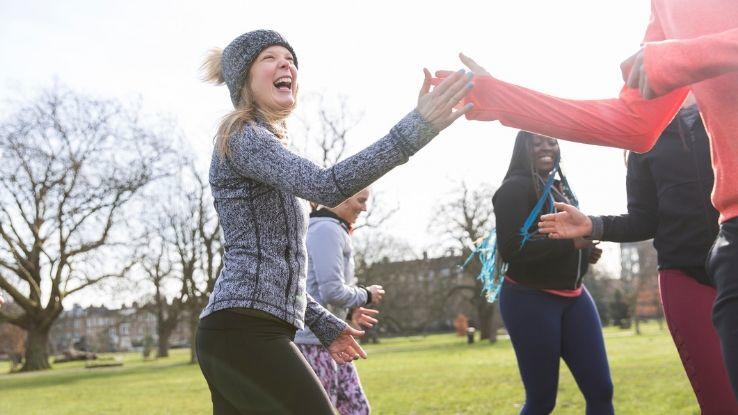30 Psychological Tricks That Will Make You the Smartest Person in the Room

What if you never had to suffer through another awkward situation again? Whether it’s a blind date, delivering a speech in front of the class or running a business meeting, uncomfortable situations can be avoided with a little bit of human psychology know-how.
Even though you can’t read the minds of others, plenty of cues can tell you what people are thinking and feeling — if you know how to read them. Try these 30 psychological mind tricks that will make you the smartest person in the room. They are backed by scientific evidence and can save you a lot of stress and heartache.
How Much Eye Contact Is Too Much?
With too much eye contact, you seem intrusive. With too little eye contact, you seem elusive. First impressions are everything, and it’s important to get it right. You don’t need to stare into the soul of every person you meet, but a quick little mind trick can help you achieve the perfect amount of eye contact. Rather than focusing on the eye contact, think about determining the eye color.

This requires looking them directly in the eyes for just a few seconds. This amount of eye contact confirms you aren’t afraid and have nothing to hide, but you’re not staring long enough to make them feel uncomfortable.
Stand Beside Your Enemies
An angry person interprets anything you do as an act of aggression. When you’re standing right in front of someone, you are quite literally going head to head with them. They can see your every move and hear your every word, which makes it easier for them to put a negative connotation on your actions.

Mentally and physically, the close proximity only escalates the situation and makes you seem like more of an opponent. Stand beside them to force them to divide their attention between you and whatever is in their field of view. Even if someone is really mad, this is a subtle way to calm them down.
Use the Bookend Effect to Your Advantage
People are most likely to remember the first and last things you do. A negative first impression is hard to forget, but a very positive final impression is an opportunity to make up for it. Always end with a bang! In both your professional and your personal life, plan your final interactions with people to be memorable.

Know your strengths and weaknesses. If conversation is not your strong suit, start your dates in a restaurant — where there will be plenty of things to talk about — and end with an exciting activity designed to leave your date wanting to spend more time with you.
A Surefire Way to Make Everyone Like You
Of course, there are dangers to being too much of a people pleaser, but it’s generally a positive thing for people to like you. As long as you do it with sincerity, people love being complimented, and they love being heard. Find something nice, sincere and situation-appropriate to say to someone — and watch them come to life.

For people you spend a lot of time with, you can get even further into their good graces by working a reasonable repetition of what they just said into your responses to them. This shows you actually listened to what they had to say.
That’s Excitement, Not Nerves
Did you know that negative anxiety and positive excitement cause all the same reactions within the body? For both emotions, cortisol is released into the bloodstream, the same areas of the brain become active and breathing and heart rates increase. This makes it very easy to mentally control anxiety by telling yourself that you’re actually just excited.

Instead of saying “I’m scared of situation XYZ,” say, “I’m excited about situation XYZ.” The scientific term for this phenomenon is anxious reappraisal. Rather than letting nervous energy hold you back, you convert that energy into excitement and anticipation for situations that would usually make you uncomfortable. You’re simply more likely to do better in situations when you’re excited.
People Are Sheeple
Regardless of age and education, people tend to follow each other, and everyone wants to fit in. If you’re having a conversation with someone, that person wants to fit in with you. When you need someone to calm down, speak at a slow, calm pace. Breathe loudly and steadily and whisper.

Even if people are having a crisis, they are more likely to calm down by following the cues you subconsciously send. On the other hand, people are more likely to meet and exceed your level of anxiety if you speak loudly, breathe fast or show any other signs of agitation.
How to Get a “Yes” to Anything
People are more likely to agree to something if it seems like less work for them. For example, if you want your parents to pay for your wedding reception, don’t ask for that outright. Instead, ask them to pay for the DJ. Once they agree to that, ask about paying for the catering. Finally, ask them to pay for the decorations.

All of this should be done slowly but surely within the same conversation. It’s easier to convince someone to do several small things than it is to convince them to do one big thing.
Just Be Honest
When you’re asking someone for help, start the conversation by specifically saying you need help. That phrasing tugs at their inner sense of altruism — their need to help others. When you say you need help, people develop a sense of duty toward you.

In a friend’s mind, turning you down when you’ve specifically said you need help feels more like saying no to a child in need than saying no to a friend asking for a favor. A request for help allows them to save the day and “be a good person” for helping you, and that makes them feel better about themselves. Speaking of being the bigger person, this next trick will help you “win” every argument.
Kill Them with Kindness
From a psychological standpoint, the person who came up with the phrase “kill them with kindness” may have been a little more sinister than you thought. When someone is mad, the most effective way to make them angrier is to absolutely refuse to reciprocate their anger. Stay calm — and don’t scream. Just make reasonable, non-retaliatory statements without arguing.

This makes you look better to anyone observing the confrontation, and when the angry party later replays the situation in their mind, they won’t be able to harp on the negative things you did. All they will remember is that you weren’t mad, and that may help them see your side of the situation.
Let Them See Themselves
If you work in a setting where you’re likely to face angry customers (or fellow workers), position a mirror behind you so anyone who approaches you can also see themselves. Even the most belligerent people catch of glimpse of themselves and realize that going ballistic on someone doesn’t look good and isn’t socially acceptable.

When people see themselves yelling in the mirror, they are likely to realize they look foolish and temper their own emotions. They may even be ashamed of their behavior. This simple trick is often more effective than anything you could say to calm someone down.
The Real Way to be a Handshaking Pro
Whether it makes sense or not, people — especially in the corporate world — put a lot of stock in handshakes. Across generations, opinions on what makes a good handshake differ. Depending on who’s on the receiving end, a bone-crushing handshake could be viewed as perfect or offensive, but there’s one thing that everyone agrees on: No one likes a freezing cold handshake.

Before you shake someone’s hand, rub your hands together briefly so your hand is comfortably warm, rather than jarringly cold. Don’t get carried away, however. Hands that are too warm are just as alarming as hands that are clammy or cold.
It’s Easier to Get Friends When You Already Have Them
How many ugly clothes have you bought simply because the styles were popular? That logic explains why not having friends may be keeping you from finding friends. People are attracted to things — and that includes people — that other people want. That means people are more likely to become friends with someone who already has a lot of friends. Others may not see your value until they see that other people value you.

This may sound childish, but plenty of scientific evidence supports the fact that humans love validation. In theory, the same is true for attracting a partner, but, of course, people who are attracted to people who already have partners really don’t make the best partners. That one is a bit of a dilemma.
Never Ask for Help in a Group Text
Have you heard the stories where dozens of people walked by and did nothing as someone died on the street? It’s called the bystander effect. For whatever reason, when other people around, people are less inclined to personally help because they believe someone else will surely step up. The bystander effect also proves true in less critical situations.

If you need four friends to help you move furniture and you ask all four of them in a group text, you’re increasing the chance some of them will say no because they think the others will say yes. If you send each of them an individual text, you are more likely to get the help you need.
See It, Do It, Teach It
To children, teachers seem like the smartest people in the world — and the smartest among them use a psychological hack for learning every day. Many versions of this idea exist, but it’s often credited to a physicist named Richard Feynman. Any new skill can be cemented into your memory by seeing it done, doing it yourself and teaching someone else to do it.

This has proven to be one of the best ways to learn. In jobs that require hands-on skills, supervisors sometimes train one employee and then oversee the trained employee as he or she trains someone else.
Earworms, Be Gone!
To get rid of an earworm — thankfully, a song you can’t get out of your head and not a real worm — give in to it and play the entire song. Really listen to the song and sing along with any lyrics you can remember. You probably mentally sing hundreds of songs each day, but earworms stick out because the mind keeps “singing” one portion of the song over and over.

This usually happens because you either don’t know or the lyrics or you keep getting them wrong. When the earworm appears in the brain, it’s because you can’t finish that song — and your brain really wants you to finish it. Give it what it wants, and you can go about the rest of your day with one less song stuck in your head. The next hack will help improve your conversation skills.
Mastering the Art of Conversation
If you’re not good at maintaining conversation, you probably think that more practice is what you need to improve, but that’s not always the case. If you want other people to feel good about talking to you, you need to get them to do most of the talking. People love to talk about themselves. Ask questions that scratch just under the surface, and let them tell you all the details.

Your questions should require more than one-word answers but still leave them with room to share as much or as little as they want. Even if they spend the entire conversation answering just one of your questions, they will enjoy the experience.
Don’t Save Fun for the Weekend
The weekend only represents two out of every seven days. People who put too much emphasis on the weekend are more likely to feel depressed and disengaged about school, work and any other activities they engage in during the week. Track your feelings in a journal for a week.

Once you determine which weekday you dislike the most, commit to doing something on that day of the week that will make you happier. It could be something as small as watching the sunset or eating out for lunch. When you treat yourself to fun activities during the week, you develop a more leveled-out sense of contentment.
Shoot for the Stars
Deep down, everyone wants to make other people happy. This trick is similar to the idea of asking for smaller things, but it works in reverse. Rather than asking someone to do what you actually want, ask them for something outrageous. They will undoubtedly say no to the over-the-top request, opening the door for a better answer to your true request.

At this point, as long as the second thing you ask for seems reasonable, they are more likely to agree because they don’t want to disappoint you a second time.
There Is Good Gossip
Grownups should be mature, but you already know it doesn’t always work out that way. In some cases, a workplace can have just as much gossip and backbiting as a high school cafeteria. If you find yourself in a sticky situation at work, use the rumor mill to your advantage. Go to the office blabbermouth and start talking about all the good things about your coworkers.

When the blabbermouth passes your comments on, you will get a reputation for saying good things about other people, which absolves you of any guilt from all the gossip. Make sure your compliments are sincere, and don’t say anything you would be embarrassed for the person you’re complimenting to hear.
Teach People How to Treat You
Without thinking about it, people tend to imitate each other. If you’re happy, the person next to you feels happy. If you’re sad, the person next to you feels sad. When you’re always excited and enthusiastic, people around you strive to match your emotions, and they start to associate excitement and enthusiasm with you — always a good thing.

This could make the most popular person fall for the lone wolf or the prospective employer notice something special about the least-qualified applicant. It all goes back to treating people the way you want to be treated — but with a bit of an ulterior motive.
Imitation Is the Best Form of Flattery
If you want to impress someone, interact with them in the same way they interact with you. If a guy shakes your hand firmly, shake his hand firmly in return. If a woman diverts the conversation from sports to movies, go with the flow and talk about movies. People do these things because they feel it’s the right way to act in the situation.

By copying them, you match their ideal of the perfect date, coworker, intern, employee or friend. Of course, avoid doing things that are too similar, such as copying the way they laugh, as that is generally seen as offensive.
Be Hands-On
In your business and social life, it’s good to touch other people. We often hear so much about people who touch others inappropriately that we forget there are appropriate — and beneficial — ways to touch. Sometimes, in an effort to seem professional or cool, we avoid all contact and come off as distant and cold.

Handshakes, hugs and pats on the back are appropriate ways to show human connection. Both the setting and the recipient determine what is appropriate. A brief touch can deepen emotional bonds and form a stronger relationship. In general, appropriate touches are very quick and stick to “safe” parts of the body — arms, hands and shoulders, for example.
Hope for the Best
There are many situations in life where other people have the upper hand, but that shouldn’t cause you to lose confidence. No matter what the circumstances are, you and your antagonist are simply two humans interacting with each other. Neither of you is necessarily better or worse, and both of you guide the course of the interaction.

Start by convincing yourself the other person enjoys interacting with you. If you truly believe you both want to be involved in the interaction, you will exude a level of confidence that is inviting — rather than off-putting.
How to Build Confidence
If you don’t think you’re good enough for something, there’s a reason for that. Maybe something happened to you, or maybe someone said something to you. Either way, at some point, something caused you to stop believing in yourself.

In the same way you can convince yourself of negative things, you can convince yourself of positive things. This will happen gradually as you keep telling yourself you can do it. Eventually, your positive thoughts translate into positive results, and you start to believe in yourself once again.
In a Crowd, Use Your Eyes As Signals
Is there anything more awkward than bumping into someone in a crowded hallway or on a busy sidewalk? When a lot of people are walking in the same small space, it’s impossible to tell where everyone is stepping next. By keeping your eyes focused on the direction you’re traveling, you signal your next move to everyone around you.

The best way to do this while keeping your eyes in front of you is to focus on looking over the shoulder of someone ahead of you who is moving along your desired path. That way, you can see the crowd, and the crowd can also see where you’re heading next.
Get the Results You Want By Defining the Options
When you need someone to do something, present them with two options that would both satisfy your needs. If you want to break up with someone, ask if they want to end the relationship or if they prefer you do it. When trying to motivate a coworker, you could ask if they want to be on the team that presents the project or on the presentation design team.

This allows people to feel like they’re controlling the situation, but they’re actually doing exactly what you want them to do. This negotiation method also removes any room for debate.
Can You Repeat That?
Unfortunately, dealing with angry people is a part of life. When someone says something to you that really crosses the line, calmly ask them to repeat themselves. This gives you a few more seconds to collect yourself, and it gives the aggressor a second chance to think about their statement.

Many people backtrack when given the opportunity, allowing you to respond to the nicer version of what they said. Of course, this only works if the aggressive party genuinely believes you didn’t hear them the first time. Inflection is everything, and asking them to repeat themselves in a confrontational tone of voice can be extremely provocative.
Own Up to Your Mistakes
When confronted with something you’ve done wrong, be honest and sincerely apologetic. If you can’t sincerely apologize for your actions, explain the reasons you don’t feel you can apologize — and make sure they are valid reasons.

People often expect the worst of others. If you’ve done something wrong, those who confront you may expect you to lie or try to cover up what you’ve done. When you surprise them with your honesty, they are more likely to grant you a bit of leniency. Even if they aren’t forgiving, you can always feel good about doing the right thing by not being deceitful.
Write Down Your Biggest Fears
When you’re feeling very anxious, writing down those feelings can help you feel better. To write your feelings, you must acknowledge them and understand them. Once you do that, it’s much easier to mentally let go of the anxiety.

Now that your fears are on the table, you can focus your mental energy on taking action to work through the problem, rather than thinking about how it could go wrong. The same is true when you pray or talk to a friend, but some feelings are so intense that it’s easier to write them down than to vocalize.
Focus on the Feet
Let’s face it: Some people are really good at faking. If you ever find yourself talking and talking and you can’t tell if the listener is actually into what you’re saying, glance down at their feet. Subconsciously, people tend to point their feet in the direction they want to be. If their feet are pointing toward you, they are actually interested in continuing the conversation.

If their feet are pointing to something else, like the door, they want to get away from you. This is your cue to gracefully allow them to exit, rather than droning on. This doesn’t necessarily mean they don’t ever want to hang out with you, but it does mean they would rather be doing something else at the moment.





